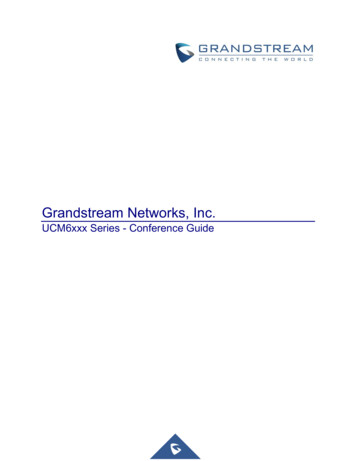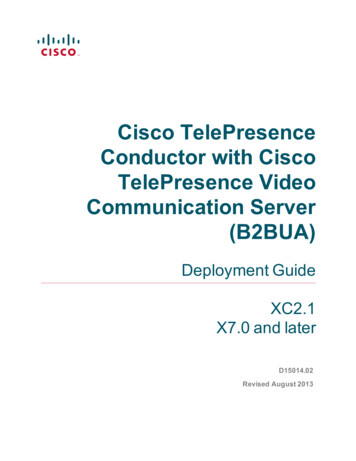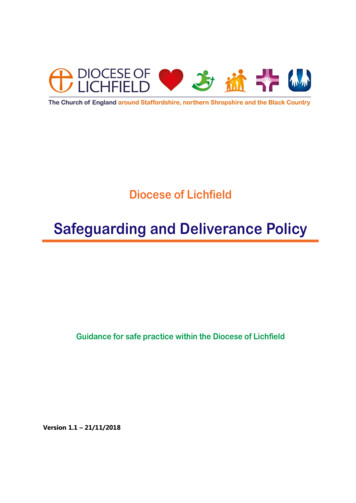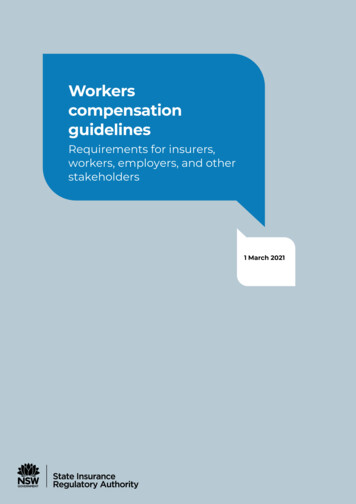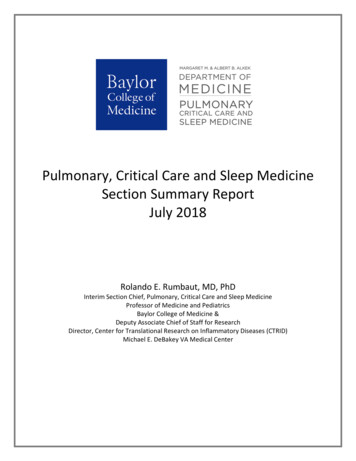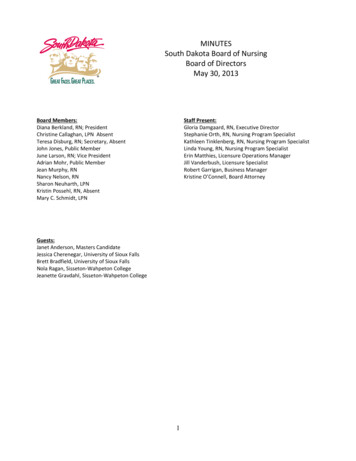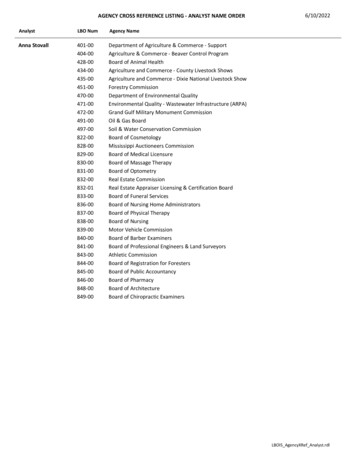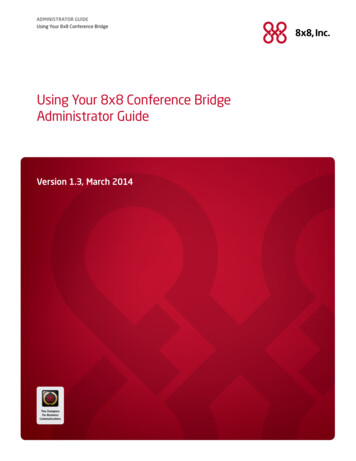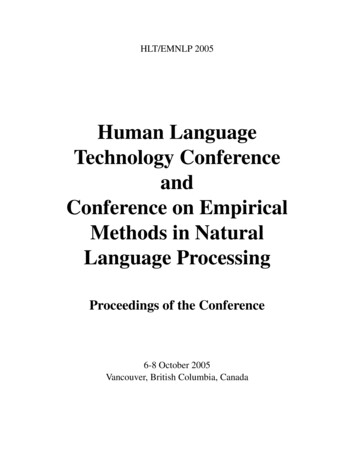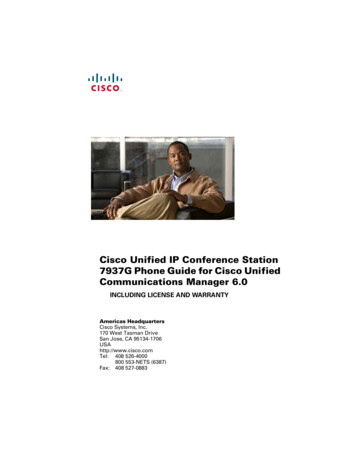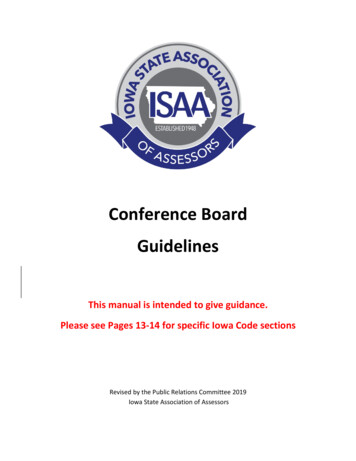
Transcription
Conference BoardGuidelinesThis manual is intended to give guidance.Please see Pages 13-14 for specific Iowa Code sectionsRevised by the Public Relations Committee 2019Iowa State Association of Assessors
Table of ContentsPageIntroduction 3Conference Board Membership . .3County Conference Board .3City Conference Board 3Voting . 4Examining Board Membership . 4Board of Review Membership . .5City Board of Review 5Gender Balance of Appointed Boards 6Appointment of the Assessor 6Special Examination .7Reappointment of Incumbent Assessor .8Removal of Assessor 8Deputy Assessor Appointment . 9Budgets .9Assessment Expense Fund .9Budget Amendments .10Emergency Fund .10Open Meetings .11Public Notice and Access to Meetings 11Closed Meetings 11Electronic Meetings .11Summary .12References .132
IntroductionThe conference board serves as the governing board for the office of the assessor. Theconference board has the responsibility of appointing members of the examining board,members of the board of review, and the assessor. The conference board shall annuallyreview, propose changes if necessary, and adopt the assessor’s budget. The conference boardapproves the position of deputy assessor, the number of deputy assessors and reappointmentof the assessor. The conference board shall have power to employ appraisers and othertechnical help to assist in the valuation of property. It is important that the members areknowledgeable of their responsibilities outlined in chapter 441 of the Code of Iowa. This guidewas created to give the conference board membership an overview of those responsibilities.Conference Board MembershipIn each county and each city having an assessor, there shall be a conference board. Countyand city boards shall consist of three units.County Conference BoardThe county conference board shall consist of the mayors of all incorporated cities whoseproperty is assessed by the county assessor, one representative from the board of directorsof each high school district who is a resident of the county, and members of the county boardof supervisors. Each school district shall, at their organizational meeting, appoint a directorto serve a one-year term on the conference board. Each high school district within the county,regardless if they have a school located in the county, is entitled to a member on the countyconference board. Again, that member must be a resident of the county. The clerk of theconference board shall be notified of the appointee. There are no provisions in the Code ofIowa for alternates or substitutes to serve for members of the conference board except themayor pro-tem may serve in the absence of the mayor. A mayor pro-tem must be a councilmember who was previously designated. The chairperson of the county board of supervisorsshall act as the chairperson of the county conference board and the county assessor as clerk.City Conference BoardThe city conference board consists of the members of the city council, the county board ofsupervisors, and the entire board of directors of school districts having property located withinthe city. The mayor shall act as chairperson of the city conference board and the city assessoras clerk.3
VotingIn any action taken by the county conference board, the mayors of all incorporated citieswhose property is assessed by the county assessor shall constitute one voting unit, thedesignated school board representatives shall constitute one voting unit, and the countyboard of supervisors shall constitute one voting unit, each unit having a single vote.In any action taken by the city conference board, the members of the city board of educationconstitute one voting unit, the members of the city council shall constitute one voting unit,and the county board of supervisors shall constitute one voting unit, each unit having a singlevote.No action shall be valid except by the vote of not less than two out of the three units. At leasttwo members of each voting unit must be present in order for the unit to cast a vote. Themajority vote of the members present of each unit shall determine the vote of the unit. Votesshould be counted individually on roll call or by show of hands, or some similar method, so asto clearly indicate and make public the vote of each individual member on each question andwith votes shown in the minutes. In the event a tie vote of one unit and the other two unitshave opposite votes, the result would be deadlock. Should this be a matter that wasimperative for a decision to be made, another vote should be taken. Should the result remaindeadlocked, the chairperson would call another meeting and efforts should be made to haveall conference board members attend the meeting. Again, if a member of a conference boardis absent from a meeting, the member’s vote may not be cast by another person, except thata mayor pro-tem may vote for the mayor when the mayor is absent from or unable to performofficial duties.Membership of the Examining BoardIn establishing an examining board, each voting unit of the conference board independentlyappoints one person, who is a resident of the jurisdiction, to contact some or all persons on thelist of eligible candidates from the Department of Revenue for the position of assessor. Theexamining board may interview and administer further examinations to the candidates. Theexamining board may, but is not required to, submit a recommendation to the conference board.Members of the examining board shall serve without compensation. The terms of eachexamining board member shall be for six years. A member of the examining board may beremoved by the appointing unit after specific charges have been filed. If the discharged memberso requests, the conference board is required to hold a public hearing on the dismissal.4
Membership of the Board of ReviewThe conference board appoints a board of review to act on assessment appeals and reviewassessments within the jurisdiction. At the discretion of the conference board, the board ofreview may consist of three or five members. In jurisdictions where there is a city with apopulation of 125,000 or more, the board of review may consist of 10 members.As nearly as possible, the board shall include one licensed real estate broker and oneregistered architect or person with experience in the building and construction field. In thecase of a county, at least one member of the board of review shall be a farmer. Not morethan two members of the board of review shall be of the same profession or occupation andmembers must be residents of the jurisdiction. In determining eligibility for membership ona board of review, a retired person shall not be considered to be employed in the occupationhe or she pursued prior to retirement, unless that person remains in reasonable contact withhis or her former occupation, including some participation in matters associated with thatoccupation.The terms of the board of review members shall be for six years and shall be staggered. Aconference board may decrease the board of review’s membership from five to threemembers by not filling two positions as they become vacant. To increase the membershipfrom three to five members, the conference board needs only to appoint two additionalmembers. When increasing or decreasing the membership, the conference board must ensurethe existence of staggered terms for board of review members. A ten- member board ofreview may be increased up to a maximum of fourteen members if necessary, to resolve theprotests in a timely manner.City Board of ReviewA city council of a city having a population of 75,000 or more which is a member of a countyconference board may provide, by ordinance, for a city board of review to hear appeals ofproperty assessments by residents of that city. The members of the city board of review shallbe appointed by the city council. The city shall pay the expenses incurred by the city board ofreview. However, if the city has a population of more than 125,000, the expenses incurred bythe city board of review shall be paid by the county. If a city having a population of more than125,000 abolishes its office of city assessor, the city may provide, by ordinance, for a city boardof review or request the county conference board to appoint a ten-member county board ofreview. The initial ten-member county board of review shall consist of the members of the5
city board of review and the county board of review who are serving unexpired terms of office.The members of the initial ten-member county board of review may continue to serve theirunexpired terms of office and are eligible for reappointment for a six-year term.Board of review members may be removed by the conference board for cause, although theconference board must hold a public hearing if requested by the dismissed member.Gender Balance of Appointed BoardsSince both the examining board and the board of review are appointed boards, they shall begender balanced. In complying with section 69.16A of the Code of Iowa, no person shall beappointed to any board if that appointment or reappointment would cause the number of themembers of the board of one gender to be greater than one-half the membership of the boardor plus one if the board has an odd number of members. A good faith effort must be madefor a period of three months to appoint a qualified person to fill a vacancy on a board. Fairand unbiased methods should be used to select the best qualified applicants.Thisrequirement shall not prohibit an individual whose term expires prior to January 1, 2012, frombeing reappointed even though the reappointment continues an inequity in gender balance.Appointment of AssessorThe appointment of the assessor is a more complex process than is the appointment of themembers of the examining board or board of review. Within seven days of a vacancy in theoffice of a city or county assessor, the examining board must request a register from theDirector of Revenue containing the names, in alphabetical order, of all individuals eligible forappointment as assessor. Only those persons who have passed an assessor examinationadministered by the Department of Revenue can be considered for appointment.The testscores of individuals on the register shall be given to a city or county conference board uponrequest. At its own expense, the examining board may interview candidates and administerfurther examinations in preparation of making a written report to the conference board. Theexamining board shall then submit a written report of the examination to the conferenceboard within fifteen days after the receipt of the register from the director of revenue.Persons whose names appear on the register of eligible candidates have been granted eitherregular or temporary certification by the Director of Revenue. Persons holding regularcertification have passed the exam and possess at least two years of appraisal-relatedexperience. Persons with regular certification may receive an appointment as assessor6
without any further action necessary. If the conference board appoints a person holding atemporary certificate, that person must satisfactorily complete a course of study prescribedand administered by the Director of Revenue. A person with a temporary certificate haspassed the written examination, but is lacking in two years of appraisal related experience. Ifthe course of study is not satisfactorily completed within eighteen months of theappointment, the person’s temporary certification is revoked, the appropriate conferenceboard is notified, and the conference board must select a new assessor. In any event, theconference board must reimburse the Department of Revenue for all expenses incurred insuch an assessor’s training program.Within seven days of receiving the examining board’s report, the chairperson of theconference board by written notice shall call a meeting of the conference board to appoint anassessor. The conference board shall appoint an assessor from the register of eligiblecandidates. The chairperson of the conference board shall give written notice to the Directorof Revenue of the appointment and its effective date within ten days of the decision of theboard.Special ExaminationIf the conference board fails to appoint an assessor from the list of individuals on the register,the conference board shall request permission from the Director of Revenue to hold a specialassessor’s examination in the particular city or county in which the vacancy has occurred.Permission may be granted by the Director of Revenue after consideration of factors such asthe availability of candidates in that particular city or county. The Director of Revenue shallconduct no more than one special examination for each vacancy in an assessing jurisdiction.The examining board shall give notice of holding the examination for assessor by posting awritten notice in a conspicuous place in the county courthouse in the case of county assessors,or in the city hall in the case of city assessors, stating that at a specified date, an examinationfor the position of assessor will be held at a specified place. Similar notice shall be given atthe same time by one publication of the notice in three newspapers of general circulation inthe case of a county assessor, or in case there are not three such newspapers in a county, thenin newspapers which are available, or in one newspaper of general circulation in the city inthe case of city assessor. The conference board of the city or county in which a specialexamination is held shall reimburse the Department of Revenue for all expenses incurred inthe administration of the examination, to be paid for by the respective city or countyassessment expense fund. Following the administration of this special assessor examination,7
the Director of Revenue shall certify to the examining board a new list of candidates eligibleto be appointed as assessor and the examining board and conference board shall proceed inaccordance with the provisions of 441.6 Code of Iowa.Reappointment of Incumbent AssessorThe term of office of an assessor appointed shall be for six years. Appointments for eachsucceeding term shall be made in the same manner as the original appointment except thatnot less than ninety days before the expiration of the term of the assessor the conferenceboard shall hold a meeting to determine whether or not it desires to reappoint the incumbentassessor to a new term. The conference board may reappoint the incumbent only if he or shehas successfully completed a continuing education program prescribed by the Director ofRevenue. Upon receiving credit equal to one hundred fifty hours of classroom instructionduring the assessor's current term of office of which at least ninety of the one hundred fiftyhours are from courses requiring an examination upon conclusion of the course, the Directorof Revenue shall certify to the conference board that the assessor is eligible to be reappointedto the position.If the decision is made not to reappoint the assessor, the assessor shall be notified, in writing,of such decision not less than ninety days prior to the expiration of the assessor's term ofoffice. Failure of the conference board to provide timely notification of the decision not toreappoint the assessor shall result in the assessor being reappointed. If the incumbentassessor is not reappointed as above provided, then not less than sixty days before theexpiration of the term of said assessor, a new assessor shall be selected as provided in section441.6 Code of Iowa.Removal of AssessorThe assessor may be removed by a majority vote of the conference board, after charges ofmisconduct, nonfeasance, malfeasance, or misfeasance in office. The removal can take placeonly after a public hearing, if requested by the assessor by written notice served upon thechairperson of the conference board.In the event of the removal, resignation, or death of the said assessor, the conference boardshall proceed to fill the vacancy by appointing an assessor to serve the unexpired term in themanner provided in section 441.6 Code of Iowa. Until the vacancy is filled, the chief deputyshall act as assessor, and in the event, there be no deputy, in the case of counties the auditor8
shall act as assessor and in the case of cities having an assessor the city clerk shall act asassessor.Deputy Assessor AppointmentAs the conference board directs, one or more deputy assessors may be appointed by theassessor. Each appointment shall be made from either the list of eligible candidates who havepassed the deputy examination, or candidates eligible for appointment as assessor. Followingthe administration of the deputy examination, the Director of Revenue shall establish aregister containing the names, in alphabetical order, of all individuals who are eligible forappointment as deputy assessor. The test scores of individuals on the register shall be givento a city or county conference board upon request. All eligible individuals shall remain on theregister for a period of two years following the date of certification granted by the Director.Deputy assessors shall also comply with the continuing education requirements except thatthe number of classroom hours shall be ninety of which at least sixty are tested.The assessor may peremptorily suspend or discharge any deputy assessor under the assessor'sdirection upon written charges for neglect of duty, disobedience of orders, misconduct, orfailure to properly perform the deputy assessor's duties. Within five days after delivery ofwritten charges to the employee, the deputy assessor may appeal by written notice to thesecretary or chairperson of the examining board. The board shall grant the deputy assessor ahearing within fifteen days, and a decision by a majority of the examining board is final.BudgetsThe conference board is charged with approving and adopting an annual budget forassessment activities. By January first of each year, the assessor, examining board, and boardof review, each prepare a proposed budget for the ensuing fiscal year.Assessment Expense FundThe assessor must consolidate the three budgets for the assessor, examining board and boardof review. The combined budgets shall contain an itemized list of the proposed salaries of theassessor and each deputy, the number and combined salaries for field and other personnel;the estimated amount needed for expenses, printing, mileage, and other expenses necessaryto operate the assessor’s office, the estimated expenses of the examining board, and thesalaries and expenses of the local board of review. The conference board may also employ9
technical or subject matter experts like outside appraisers and legal counsel to support thevaluation of property and these expenses should be included in the assessment expense fund.The maximum tax rate which may be levied for the assessment expense fund is aligned withthe amount of assessed valuation of property within the assessing jurisdiction and shall notexceed sixty-seven and one-half cents per thousand dollars of valuation.Two conference board meetings are generally needed to finalize a budget. The first meetingincludes presentation of the proposed budget to the conference board by the assessor andapproval by the conference board for publication in a local newspaper. The second meetingincludes the public hearing to formally adopt the budget and must be held not less than 10,nor more than 20 days from the date of publication The budget adopted by the conferenceboard at the public hearing will set the final budgeted amounts and associated levy rate, andmust be certified in duplicate to the county auditor by no later than March 15.Budget AmendmentsThere is no need to amend a budget if individual line items amounts are exceeded (withexception of Assessor/Deputy salaries) as that is allowed by statute. If overall expendituresfor the year will exceed budgeted amounts, a budget amendment is required. Amendmentsmay be made until May 31st of that fiscal year.Prior to adoption, budget amendments must be filed and published with notice of publichearing. Common examples of scenarios requiring a budget amendment include expensesthat are budgeted in one fiscal year and aren’t incurred until a following year. A budgetamendment may not increase the total taxes collected for that budget and any increases inplanned expenditures must be covered by existing cash balances.Emergency FundThe conference board also has the authority to levy a tax for an emergency fund at a rate notto exceed twenty-seven cents per thousand dollars provided an affirmative vote of theconference board agrees to petition the State Appeal Board for written approval.10
Open Meetings LawAs a political subdivision, a conference board is subject to the provisions of the Iowa OpenMeetings Law. For each meeting, the clerk shall record in a minute book all actions of theconference board. The minutes shall be public record open to public inspection.Public Notice and Access to MeetingsA conference board must provide public notice of all meetings. A conference board shall giveat least twenty-four hours’ notice prior to holding a meeting. The notice must contain thetime, date, place, and the tentative agenda for the meeting. The notice must be posted in aprominent place in the building where the meeting will be held. If it is necessary to hold ameeting without giving twenty-four hours’ notice, the minutes must state why notice was notpossible. Holding a meeting without giving twenty-four hours’ notice can be done only if itwould be impossible or impractical to do so. Even then, as much notice as is possible must begiven. The law permits the use of cameras or other recording devices at any open meeting.Meetings must be held at a time and place reasonably accessible and convenient to the public.If this is impossible or impractical, the reasons for doing otherwise must be stated in theminutes.Closed MeetingsMeetings of a conference board can be closed to the public only for reasons established inchapter 21.5 Code of Iowa. An affirmative vote of the conference board is required to enterinto a closed session. The vote to hold a closed session must be held during an open meetingof the board. The vote of each member must be announced at the open session and enteredinto the minutes. During the closed session, no matters can be discussed other than thosedirectly relating to the specific reason for holding the closed session. The board must keepdetailed minutes of all discussions, the persons present, and actions occurring during theclosed session. A tape recording must be made of the closed session. Both the minutes andthe tape recording must be sealed, and are not open for public inspection, except as orderedby court.Electronic MeetingsSection 21.8 of the Iowa Code permits governmental bodies to conduct a meeting byelectronic means under limited circumstances. It must be impossible or impractical to holdthe meeting in person, and only to the extent the public has a similar opportunity to beinvolved/observe the meeting as they would a regular non-electronic meeting. As near as is11
reasonably possible the public must be provided access to the conversation. Minutes must bekept of the meeting, and shall include a statement explaining why a meeting in person wasimpossible or impractical. There must be compliance with the public notice requirements setforth in Section 21.4 of the Code.SummaryWe hope the information within this handbook has assisted you in understanding yourduties. It should be remembered it is the responsibility of the conference board to appointthe assessor but the assessor appoints the deputies (providing the conference board hasauthorized a deputy position) and hires all the employees. The assessor has the entireresponsibility to establish values of all assessable property within the jurisdiction inaccordance with the Code of Iowa. The values are to be adjusted and approved by the localboard of review. The final approval is by the Iowa Director of Revenue through the processof equalization.Should you want additional information concerning the conference board, contact yourassessor or the Iowa Department of Revenue. Please refer to the following page fornumerous references used in compiling this publication.Public Relations CommitteeIowa State Association of Assessors12
ReferencesThe following is a list of Iowa Code Sections for referral use:APPRAISER441.50Appraisers 441.13441.17Office of Assessor CreatedExamination and CertificationAppointmentSpecial ExaminationTerm and Filling of VacancyRemoval of AssessorExamination and Certification of DeputiesIncumbent DeputiesOffice PersonnelDutiesASSESSORBOARD OF ent of MembersTerm of Office and VacanciesSessionsQuarters and ExpensesPowers of BoardLegal CounselBUDGET441.1624.324.424.524.624.9CONFERENCE BOARD441.2Maximum Allowed Etc.Requirements of the BudgetTime of FilingItemized EstimateEmergency LevyAmendment of BudgetOrganization & General Information13
EXAMINING BOARD441.3441.4Appointment & General InformationRemoval of MemberOPEN MEETINGS21.321.421.521.8Meetings of Governmental BodiesPublic NoticeClosed SessionElectronic MeetingsGENDER BALANCE69.16AGender BalanceThe following is a list of Iowa Administrative Code {701} Chapters for referral 23.8Conference BoardsBoard of ReviewAssessor ComplianceSpecial ExaminationRegister of Eligible CandidatesCourse of Study – Provisional AppointmentExamining BoardAppointment of AssessorReappointment of AssessorConference Board and Assessor Notification/Continuing Education14
441.5 Examination and Certification . 441.6 Appointment . 441.7 Special Examination . 441.8 Term and Filling of Vacancy . 441.9 Removal of Assessor . 441.10 Examination and Certification of Deputies . 441.11 Incumbent Deputies . 441.13 Office Personnel . 441.17 Duties . BOARD OF REVIEW 441.31 Appointment of Members

